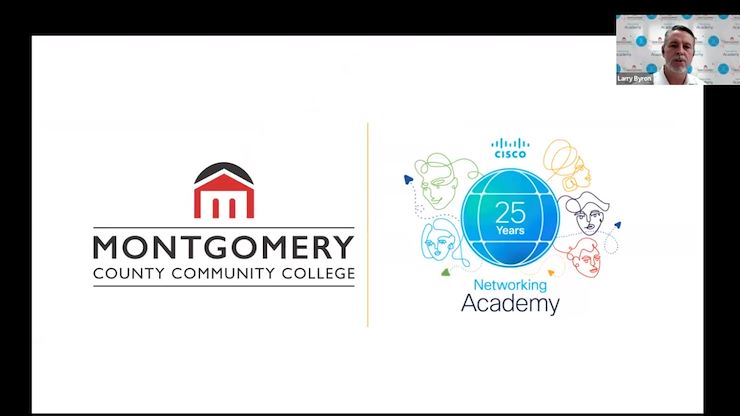
Montgomery County Community College's Workforce and Economic Development Division hosted its annual business roundtable discussion to look at the economy with guest speakerJeff Cox, CNBC.com journalist and economics editor; share news about WEDnetPA funding for training; and introduce the proposed IT Help Desk Support Technician Apprenticeship Program, among other topics.
Montgomery County Community College’s Workforce and Economic Development Division hosted its annual Business Roundtable on June 14 to discuss the current economic climate and provide an overview of training programs, funding options and additional resources to help businesses attract, train, and retain talent in the region.
MCCC’s Dean of Workforce and Economic Development Kyle Longacre led the roundtable discussion, welcoming more than 50 online attendees from across Montgomery County and introducing MCCC’s President, Dr. Victoria Bastecki-Perez.
Dr. Bastecki-Perez spoke about the College’s vital role in providing the training employers and employees need in today’s competitive marketplace. MCCC serves as the administrator for the Workforce & Economic Development Network of PA (WEDnetPA) training grant funds for Montgomery County. During FY22-23, MCCC administered over $450,000 of WEDnetPA funding, helping 33 companies and training nearly 500 employees.
Following her remarks, Dr. Bastecki-Perez introduced the keynote speaker, Jeff Cox, a journalist and economics editor for CNBC.com. Cox covers the latest financial data, including the Federal Reserve and how the developments impact the financial markets.
State of the U.S. Economy
During his remarks, Cox described the economic uncertainty in recent years due to the pandemic and its impact and the current situation.
 “As a nation, there are equally strong cases, in my opinion, which make for a recession
or against a recession,” Cox said. “Strong consumer balance sheet and equally robust
demand argue for no recession. The higher interest rates working their way through
the economy combined with consumer fatigue and more risk-averse business actions argue
for at least a shallow recession. Should some type of exogenous event hit like a pandemic
or something along those lines, there’s a bigger argument for a deeper recession.
So, we are kind of on a razor’s edge here.”
“As a nation, there are equally strong cases, in my opinion, which make for a recession
or against a recession,” Cox said. “Strong consumer balance sheet and equally robust
demand argue for no recession. The higher interest rates working their way through
the economy combined with consumer fatigue and more risk-averse business actions argue
for at least a shallow recession. Should some type of exogenous event hit like a pandemic
or something along those lines, there’s a bigger argument for a deeper recession.
So, we are kind of on a razor’s edge here.”
In Pennsylvania, he said, the economy grew by 2.2 percent in 2022, which was almost identical to the national rate, and the unemployment rate is 4.1 percent, which is slightly above the national rate. Despite some challenges, he added, the state stands pretty strong on the economic development front.
He also noted that Montgomery County, with its blend of manufacturing, technology and health care, will be in the forefront of this new era, and MCCC will help to play a vital role in future development.
Workforce Training Funding through WEDnetPA
Following Cox’s keynote message, Bernadette DeBias, MCCC Director of Workforce Development, and Katina Faulk, Administrative Director for Academic Initiatives, shared information about applying for training funds through WEDnetPA.
To be eligible, companies must be located in Pennsylvania and be part of eligible industry clusters, as defined in the guidelines. The maximum grant is $2,000 per employee, up to $100,000 per company per fiscal year. Companies may only receive funding for two consecutive years or three years out of a five. Nonprofit and retail organizations are not eligible for funding.
For employees to be eligible, they must be residents of and permanently employed in Pennsylvania on a full-time basis. In addition, they must earn at least $12 per hour and be employed by the specific company location for which a grant is awarded.
Eligible training programs, explained DeBias, must start after July 1, 2023, and be completed before June 30, 2024. The programs should involve skill building for current jobs or advancement. Employers pay for the cost of training upfront and are reimbursed at completion. Companies can choose their WEDnetPA partner and the training vendors.
For more information about eligibility and training plans for WEDnetPA, contact Bernadette DeBias at [email protected]. For any questions concerning the application, contract or invoicing processes, contact Katina Faulk at [email protected].
MontcoWorks Apprenticeship Program – IT Help Desk Support Technician
Following the WEDnetPA presentation, Larry Byron, Director of Workforce Development for IT, presented the details of the MontcoWorks Apprenticeship Program for IT, which is a highly collaborative model for economic development, joining students, businesses and community partners.
An apprenticeship allows students to learn while they earn, he explained, which helps to reduce or eliminate student loan debt for students and enables them to gain industry-recognized credentials. Further, the apprenticeship helps to build a strong relationship between employees and employers.
 Looking at the current and future labor markets reveals that the growing IT field
has a demand for many employees, especially for entry-level IT generalists, Byron
said. MCCC can train students through its Cisco Networking Academy. MCCC has been a Cisco training center for more than 25 years and can help businesses
with their IT needs.
Looking at the current and future labor markets reveals that the growing IT field
has a demand for many employees, especially for entry-level IT generalists, Byron
said. MCCC can train students through its Cisco Networking Academy. MCCC has been a Cisco training center for more than 25 years and can help businesses
with their IT needs.
The proposed model for the apprenticeship program through the Cisco Networking Academy starts with training for IT Help Desk Support Technicians, who provide valuable technical assistance to computer users throughout companies. Then, through future apprenticeship programs, students can advance to Network Technician and eventually Cyber Security Support Analyst.
For the proposed apprenticeship, industry partners would hire students to work 32-40 hours per week as apprentices for 12-15 months. Employers would pay the apprentices and cover the cost of tuition (approximately $5,000). The apprentices would take classes in the evening through MCCC’s Cisco Networking Academy and receives comprehensive mentor training through the College. The apprenticeship includes a 12-week probationary period.
At MCCC, the apprentice would receive 94 hours of training over four weeks on safety, sexual harassment prevention, CompTIA A+ coursework and training. The remaining 106 hours will be held during the balance of the year at either the Blue Bell Campus or Pottstown Campus.
Apprentices will receive Cisco Netacad training, as well as training on PC hardware and preventive maintenance, mobile devices, and printers, Windows operation and configuration, mobile OS, and security and networking essentials. As part of the program, apprentices will be certified in CompTIA A+ and Cisco CCST-Networking. In addition, they will develop skills that will help them to be successful in the workplace, such as teamwork and collaboration, communication, problem-solving, critical thinking, conflict management, time management, and customer service.
On-the-job training will provide 2,000 hours of practical, real-world experience providing technical assistance for computer users. Apprentices will receive journey worker mentoring from employers and will apply the concepts they learned during training.
The proposed apprenticeship program will be a sponsored group apprenticeship, and MCCC is working with the PA Apprenticeship Office for final approval. For more information, contact Larry Byron at [email protected].
State of Montgomery County Labor Market
Following the presentation about the proposed MontcoWorks Apprenticeship Program, Jane Stein, MontcoWorks Research and Performance Officer, spoke about the state of the Montgomery County labor market and provided several resources for learning more about the job market in the county, region, and state.
Stein shared that the County’s overall unemployment rate as of April 2023 was 2.9%, which is lower than Pennsylvania’s rate of 4.1%, and the nation’s rate of 3.5%. However, she noted, during her presentation, that employers are still seeking skilled workers for unfilled positions and a skills gap continues to persist.
The Quarterly Census of Employment & Wages shows that the top five industries by average employment in Montgomery County are health care and social assistance; professional, scientific and technology services; retail trade; manufacturing; and administrative and support, waste management and remediation services. The top five industries by establishments in Montgomery County are professional, scientific and technology services; health care and social assistance; other service (public administration); retail trade; and construction.
According to the Occupational Employment and Wage Statistics, the earning potential currently is strong in southeastern Pennsylvania. Stein also discussed the diverse types of job skills that will be in demand from 2020 through 2030. In-demand work activity skills that span occupations include getting information, communication, interacting with computers, decision-making, problem-solving, and interpersonal relationships. The Pennsylvania Department of Labor & Industry’s Center for Workforce and Information & Analysis is another helpful resource for labor market information.
Following the labor market presentation, the business roundtable attendees participated in one of four breakout training sessions: Vision Alignment and Execution for Leaders, A Mind Map Session on Barriers to Retaining Employees, Empowering Your Organization with Microsoft Teams, or the Value of MCCC’s Career Services to Employers.
For more information about MCCC’s Workforce and Economic Development Division, contact Kyle Longacre at [email protected].
For anyone not able to attend, you can watch the video of the Business Roundable.
